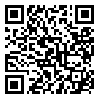Volume 22, Issue 5 (12-2022)
ijdld 2022, 22(5): 294-311 |
Back to browse issues page
Download citation:
BibTeX | RIS | EndNote | Medlars | ProCite | Reference Manager | RefWorks
Send citation to:



BibTeX | RIS | EndNote | Medlars | ProCite | Reference Manager | RefWorks
Send citation to:
Kazemi S, Sodagar S, Taghiloo S, Bahrami Hidji M, Shirzad N. A Comparison Between the Effectiveness of Lifestyle Education Based on BASNEF Model and World Health Organization Model on FBS, 2HPPBS, HbA1c in Patients with Type 2 Diabetes. ijdld 2022; 22 (5) :294-311
URL: http://ijdld.tums.ac.ir/article-1-6179-en.html
URL: http://ijdld.tums.ac.ir/article-1-6179-en.html
1- Department of Health Psychology, Karaj Branch, Islamic Azad University, Karaj, Iran
2- Department of Health Psychology, Karaj Branch, Islamic Azad University, Karaj, Iran ,sh-so90@yahoo.com
3- Department of Psychology, Astara Branch, Islamic Azad University, Astara, Iran
4- Department of Psychology, Karaj Branch, Islamic Azad University, Karaj, Iran
5- Endocrinology and metabolism (adults) Department of Internal Deasease, Medical School, Tehran University of Medical Science, Tehran, Iran
2- Department of Health Psychology, Karaj Branch, Islamic Azad University, Karaj, Iran ,
3- Department of Psychology, Astara Branch, Islamic Azad University, Astara, Iran
4- Department of Psychology, Karaj Branch, Islamic Azad University, Karaj, Iran
5- Endocrinology and metabolism (adults) Department of Internal Deasease, Medical School, Tehran University of Medical Science, Tehran, Iran
Abstract: (981 Views)
Background: The present study was conducted with the aim of comparing lifestyle education based on the Bezenf model and the World Health Organization model on FBS, 2HPPBS, HbA1c in patients with type II diabetes.
Methods: The research method was a semi-experimental and multi-group expanded type with pre-test-post-test designs and a control group with a follow-up period. The statistical population of this research included all patients with type II diabetes referred to the endocrinology department of Imam-Khomeini Hospital in 1400. In this research, from a list of 100 people with diabetes, 60 diabetic patients who met the entry criteria were identified. Then 45 people were randomly selected and replaced by random replacement in two experimental groups and one control group. Each experimental group received group psychological interventions separately, and at the end, both groups were subjected to a post-test. The obtained data were analyzed using mixed analysis with repeated measurements.
Results: The results indicate the effect of lifestyle education based on the Bezenf model and the World Health Organization model on FBS (P=0/001), 2HPPBS (P=0/001) and HbA1c (P=0/006) and the stability of this effect was in the follow-up phase. Also, compared to lifestyle education based on the World Health Organization model, lifestyle education based on the Bezenf model was a more effective method to reduce HbA1c in type 2 diabetes patients but the difference in the effect of the two groups on FBS and 2HPPBS was not significant.
Conclusion: The results indicated the effectiveness of both educational models and the superiority of the BAZENF educational model. Therefore, Lifestyle education based on the Bezenf model and the World Health Organization model can be used by therapists as adjunctive treatments in interventions for people with type 2 diabetes.
Methods: The research method was a semi-experimental and multi-group expanded type with pre-test-post-test designs and a control group with a follow-up period. The statistical population of this research included all patients with type II diabetes referred to the endocrinology department of Imam-Khomeini Hospital in 1400. In this research, from a list of 100 people with diabetes, 60 diabetic patients who met the entry criteria were identified. Then 45 people were randomly selected and replaced by random replacement in two experimental groups and one control group. Each experimental group received group psychological interventions separately, and at the end, both groups were subjected to a post-test. The obtained data were analyzed using mixed analysis with repeated measurements.
Results: The results indicate the effect of lifestyle education based on the Bezenf model and the World Health Organization model on FBS (P=0/001), 2HPPBS (P=0/001) and HbA1c (P=0/006) and the stability of this effect was in the follow-up phase. Also, compared to lifestyle education based on the World Health Organization model, lifestyle education based on the Bezenf model was a more effective method to reduce HbA1c in type 2 diabetes patients but the difference in the effect of the two groups on FBS and 2HPPBS was not significant.
Conclusion: The results indicated the effectiveness of both educational models and the superiority of the BAZENF educational model. Therefore, Lifestyle education based on the Bezenf model and the World Health Organization model can be used by therapists as adjunctive treatments in interventions for people with type 2 diabetes.
Type of Study: Research |
Subject:
Special
Received: 2022/09/27 | Accepted: 2022/12/25 | Published: 2022/12/31
Received: 2022/09/27 | Accepted: 2022/12/25 | Published: 2022/12/31
Send email to the article author
| Rights and permissions | |
 |
This work is licensed under a Creative Commons Attribution-NonCommercial 4.0 International License. |






